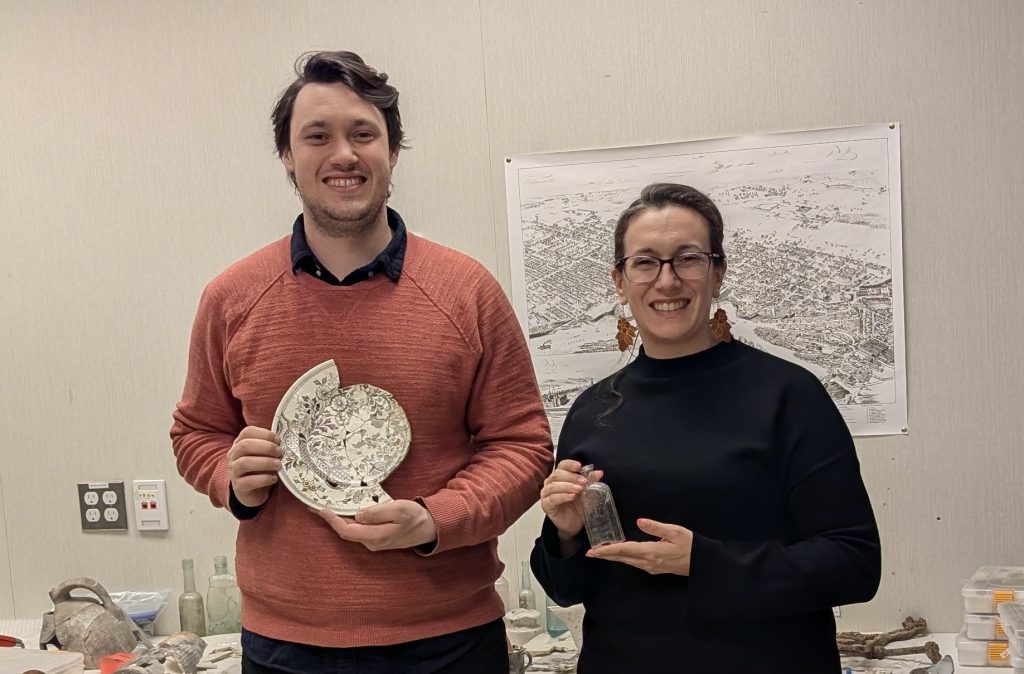A Career in Archaeology
Finding a job in the field of archaeology might seem like a daunting undertaking in Ottawa where the winters are cold, and the ground frozen, covered in snow for months. Yet for those who love digging in the dirt and discovering hidden history in Canada’s capital, there are opportunities. That is principally what job seeker Eamonn Cuerdon-Conboy learned when he decided to participate in PPRC Connect. He learned too that the generic skills and abilities he had honed during his post-secondary studies could help him find an entry-level job in archaeology with the skills he has now.
As a client of Performance Plus Rehabilitative Care Inc. (PPRC), Eamonn has access to the pre-employment mentoring service, PPRC Connect. The service matches job seekers with disabilities, like Eamonn, with mentor guides who are knowledgeable about careers in an employment sector where they want to find a job. To assist Eamonn PPRC Connect Coordinator Susan Forster engaged Monica Maika, Archaeology Program Manager at the National Capital Commission (NCC) to act as a mentor guide. Archaeologist Bob Clark, her colleague, took part as well. The NCC Archaeology Program reviews projects involving ground disturbance, assessing impacts on pre-contact and historical archaeological resources. It collaborates with federal organizations and entities in the National Capital Region, providing advice on archaeology requirements. Eamonn’s mentor, Monica, explained that there is an entry-level role that all archaeological projects require, that of field technician. These are the folks who do the so-called “grunt” work of digging at sites under the supervision of a professionally trained archaeologist. It must be said that this is hard, physically demanding work. However, there are other aspects to the job. Once experience is gained, the employer may, depending on the nature of the project, allow field technicians to work in the lab on finds (artifacts) and draft reports.
Archaeological excavations are conducted for various reasons, it can include uncovering ancient First Nations Indigenous prehistory, or learning more about early European settlement in our capital. When archaeologist Bob Clark showed Eamonn stone tools, Bob commented: “These are from the oldest site in the region which is almost 8,500 years old.”
Apart from the physical capacity to dig, Monica emphasized that the generic skills needed to be a field technician are critical thinking, ability to be self-directed, curiosity and of course interest and passion for archaeology. Commenting on her conversation with job seeker Eamonn, Monica remarked, “ It’s nice when someone is engaged. Thank you for your interest. I always find it fun to talk about archaeology.”
Monica also gave Eamonn several tips. Despite our cold weather there is an archaeology season here and it runs from April or May to November or December, depending on the weather. Having a degree in history or anthropology is relevant when applying for field technician postings. Eamonn was therefore pleased to learn that his degree in humanities fell into this category. Monica also noted that the NCC public archaeology digs are carried out mainly by volunteers led by the two-person team of herself and Bob Clark.
Where employment opportunities for field technicians do arise, is through commercial companies who conduct archaeological assessments to identify sites and conduct an assessment for viability before the dig commences. Eamonn learned that it is a best practice for those conducting projects on sites where indigenous materials could be found to actively involve local Indigenous communities, background information that could be helpful to him in job search.
Monica advised that if you want to go further in a career in archaeology, you would require more post-secondary training. But she emphasized that Eamonn could apply for entry level jobs with the skills and qualifications that he has acquired. She informed Eamonn that openings for field technicians come up as people age out of the profession. Eamonn commented, “I didn’t know that I could even enter the field and it kind of aligns with a lot of the skills that I have already honed and the interests that I have.”
The value of mentor matches are demonstrated through their effectiveness as vehicles of knowledge exchange and learning in a safe space. As Eamonn put it: “It’s great to have a mentor that I can just ask questions without it being related to a job. I like being able to just discover something about a field and no strings attached.” And how did mentor guide Monica value the conversation she had with Eamonn? Her assessment was: “I think Eamonn asked some very intelligent questions and seems invested in learning more about archaeology which I appreciate.”
